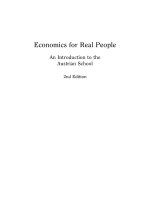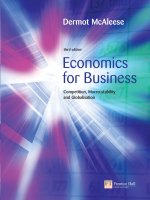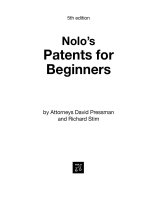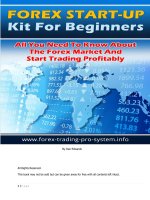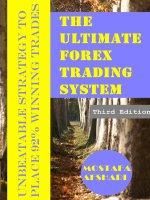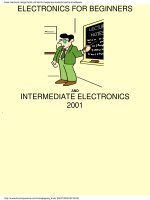Economics for beginners andy prentice, lara bryan 2021 usborne publishing ltd 9781801313834 faed7fd2ac023bf3afbbf2a326e2856d anna’s archive
Bạn đang xem bản rút gọn của tài liệu. Xem và tải ngay bản đầy đủ của tài liệu tại đây (12.11 MB, 366 trang )
How can we predict the
next economic crisis? ¿
_ an economicshelp
take from the
save the planet?
rich to give ta
the poor?
g0)
agand thing?
rnnnmir nIrnwth?
influencers so
successful?
%
+
USBORNE
ECONOMICS
FOR BEGINNERS
=aut.
aS
Contents
What is economics?
“4
+
12
4
What is an economy?
What do economists study?
How do you do economics?
6
8
10
Chapter 1: Not enough to go around
13
The things we need to survive, how we choose them,
and why there's never enough time: the big reasons why
economies exist.
Chapter 2: Markets
23
Chapter 3: Making choices
37
Chapter 4: Production, profit and competition
51
Buying and selling and how prices are set ~
as if by magic.
How do people make choices and why are those choices
often unexpected? How can businesses and governments
change people's choices? Why would they want to?
What big choices do businesses face? Why is competition so
important? Why do some businesses produce pollution and
what should we do about it?
Chapter 5: Economic systems
Is there a set of rules that would make it possible to share
everything fairly? Or is it better to have winners and losers?
What systems have people tried?
67
Chapter 6: Macroeconomics
What tools do governments use to measure the economy?
75
What effects do their choices have on individual people
and the economy as a whole?
Chapter 7: International trade
Why everyone around the world benefits from buying
and selling each other's products - and why governments
9
sometimes don’t like it.
Chapter 8: Big questions (and a few answers)
How the tools of economics help us make sense of
103
everything, from war to famine to saving the planet.
What next?
120
Glossary
Jobs in economics
Discover more
Acknowledgements
122
124
125
132
Usborne Quicklinks
For links to websites where you can find out more about economics,
from supply and demand to price bubbles and globalization, with video
clips, games, activities and quizzes, go to the Usborne Quicklinks website at
usbome.com/Quicklinks and type in the title of this book.
Here are some of the things you can do at Usborne
QuipkyP Sines to control inflation or manage the national debt
* Try test-yourself quizzes on economic terms
* Watch video clips on trade, markets and more
ease follow the internet safety guidelines atthe
Usborne
‘Quicklinks website, Children should be supervised online.
What is economics?
Some people think that economics is all about money, banks and
very complicated graphs. But it’s actually a lot simpler than that much of economics is really about understanding choices.
Imagine there are two chocolate and two pineapple cupcakes. There's enough for
four of you to have one cupcake each. How do you share them out?
‘Who wants chocolate?
‘Who wants pineapple?
En, we all want chocolate!
Let's split the cupeakes
in half, That way.
When there isn’t enough of something, it's scarce. Scarcity is an important idea
in economics - it's what forces people to make choices. You might be surprised
how often you make choices about things that are scarce.
Tomato ketchup can be
For most people, money is scarce.
needit for
any fries,
Should we do
homework or go
‘out and play?
As economists, we
try to make sense of
the problems that
‘people, businesses,
governments and even
‘entire countries face.
Iwant to
Duy a new
‘computer.
‘My mum says we've
{got twenty minutes,
‘What choices should we
‘be making? How can we
‘do things better?
‘What do you
‘think?
What is an economy?
'When a group of people is making choices about what to do, buy or
sell it creates an economy. An economy can be very small or really
DCR Cent
act asa Tychur en tas totes
An economy is created by.
..4 group of people living
under one roof.
ll mop the floor it
you do the dishes.
the people living or
working in a town or city.
ould Idrive or take
omi et
Sat
Htwe spend more money
on city parks, there will
be less to give to schools,
Allour concert
tickets are sod ont
Should we open
another shop?
Why is this city so
such poorer than
the rest of the
country?
Where should
we build new
motorway?
How are we
‘going to create
‘more jobs?
We should sell
‘Australia, too
‘We're moving to
Germany. Hopefully we'll
hhave a better life there,
‘We've been hit by
another flood. We'll have
‘to ask for help from
other countries,
We can only solve
this problem if we
all work together.
ABIG economy, such as the economy of a country or the world, is a network made up
of lots of smaller economies — all the households, villages, towns and cities within it.
What do economists study?
Economists are the people that study economies. Some focus on
individuals or small groups, while others zoom out to look at the
bigger picture. And some economists end up asking ~ and trying to
answer - some surprising questions...
Economics for good
By finding answers to all these questions, economists hope to encourage
people, businesses and goverments to make better choices - and, hopefully,
make the world a better, fairer place. Economics isn’t about labelling people or
governments as ‘good!’ or ‘bad’ - it's about observing the choices that people
make and trying to understand why they've made them.
How do you do economics?
Why do people make certain choices? What are the consequences of
those choices? To investigate these kinds of questions, economists
usually start by coming up with an explanation, or model.
Here’s a question
Here’s a model
When there's a
shortage, prices
socket and lots of
people
will suffer.
Modelling
‘This looks complicated,
‘but it's just the same
fas what I said above ~
A model is a simplified way of
explaining how something works
~ in this case the relationship
between quantity and price.
Economists often show models
using graphs, instead of words.
‘Models can be helpful for making
predictions, or forecasts.
_|
using maths!
lier wie
Ota price
Test it out
Economists can test a model by collecting
information, or data, and seeing whether
it matches the model or not.
a
‘accurate, This helped
serene
fe
ight plan
in place,
Te Mewpap0
—
awn ovr nice
mls _——_N.

